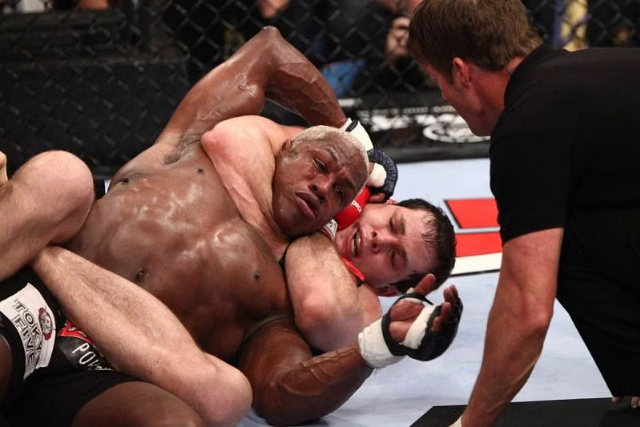In the world of self-defense, Brazilian Jiu-Jitsu (BJJ) stands out as a powerful protector, offering a unique combination of technique, strategy, and versatility. As we explore the ever-changing landscape of personal safety, the growing popularity of Brazilian Jiu-Jitsu serves as evidence of its effectiveness in real-life situations.
Originally rooted in traditional Japanese martial arts, BJJ has transformed into a discipline that prioritizes ground control, leverage, and finesse. What sets BJJ apart is its departure from relying on the increasing prevalence of Brazilian Jiu-Jitsu, which stands as proof of its efficacy in real-world scenarios.
solely on physical strength; instead, it empowers individuals with techniques that skillfully use an opponent’s movements against them.
A distinctive aspect of Brazilian Jiu-Jitsu is its adaptability in diverse situations. Whether confronting a standing adversary or navigating a ground encounter, BJJ provides practitioners with the skills to respond effectively. This adaptability distinguishes BJJ as a comprehensive self-defense system.
Is Brazilian jiu-jitsu good for self-defense?
Yes, Brazilian Jiu-Jitsu (BJJ) is extremely effective for self-defense. Unlike many traditional martial arts, BJJ focuses on ground control, leverage, and technique, allowing smaller or weaker individuals to defend themselves against larger and stronger opponents. The art’s focus on submissions, joint locks, and chokes provides practical tools for neutralizing threats without relying on brute force. BJJ’s adaptability makes it applicable in various self-defense scenarios, be they stand-up confrontations, ground disputes, or even situations involving multiple attackers.
Also Read:BB Guns for Self-Defense
Understanding Key Features and Background of BJJ for Self-Defense
Brazilian Jiu-Jitsu stands out as a highly effective self-defense martial art due to its emphasis on leverage, joint locks, and chokeholds rather than relying on brute strength. BJJ practitioners are trained to defend themselves in close-quarter combat situations, utilizing techniques such as takedowns, ground control, and submissions to neutralize opponents.
Origins and Development:
Brazilian Jiu-Jitsu’s journey began with the integration of Japanese Jiu-Jitsu and Judo techniques by the Gracie family in Brazil. The result was a martial art focused on ground control, submissions, and efficient use of energy. This fusion laid the groundwork for the development of BJJ as a distinct and potent form of self-defense.
Read: Knife for Self-Defense
Core Principles and Techniques:
At the core of Brazilian Jiu-Jitsu are principles that empower individuals to overcome opponents of varying sizes and strengths. The emphasis on leverage, technique, and positional control allows practitioners to navigate confrontations with finesse rather than relying on sheer physical prowess.

The Practicality of BJJ in Self-Defense:
In real-world self-defense scenarios, the practicality of Brazilian Jiu-Jitsu becomes evident. BJJ equips individuals with the ability to control and neutralize larger and stronger opponents through proper technique and leverage. This practical approach makes BJJ an ideal choice for self-defense, as it enables individuals to defend themselves effectively regardless of the assailant’s size or strength.
Real-World Scenarios:
- Stand-Up Conflict: In a stand-up scenario where the confrontation begins on its feet, BJJ practitioners leverage their training to gain a dominant position, effectively neutralizing threats. Utilizing techniques such as sweeps and throws, BJJ empowers individuals to control the situation even before it reaches the ground.
- Ground Confrontations: When the altercation transitions to the ground, a common occurrence in real-world situations, BJJ truly shines. The emphasis on ground control and submissions allows practitioners to nullify aggressors, rendering them incapacitated while minimizing harm to themselves.
- Multiple Attackers: BJJ equips individuals to navigate scenarios involving multiple attackers, where traditional self-defense methods may fall short. By focusing on one opponent at a time and utilizing joint locks and leverage, BJJ provides a strategic advantage that can be crucial in overwhelming situations.
BJJ Training for Self-Defense:
The efficacy of Brazilian Jiu-Jitsu (BJJ) is not solely attributed to its techniques but also to the precise training methodologies designed to instil practical skills. Let’s look into the essential aspects of BJJ training tailored for self-defense, exploring how consistency and situational awareness play pivotal roles.

Importance of Consistent Training:
Consistency is the cornerstone of mastering Brazilian Jiu-Jitsu for self-defense. Regular, dedicated practice refines muscle memory, ensuring that techniques become second nature. This not only enhances proficiency but also boosts confidence in applying learned skills under pressure, a vital component in real-world situations.
Integration of Self-Defense Scenarios:
Effective BJJ training for self-defense goes beyond drilling techniques. Instructors often incorporate realistic self-defense scenarios into classes, simulating situations that practitioners may encounter in everyday life. This approach bridges the gap between theory and application, preparing individuals for the unpredictability of confrontations.
Developing Situational Awareness:
BJJ instills a heightened sense of situational awareness in practitioners. Beyond the physical aspects, students learn to assess and adapt to dynamic environments, a crucial skill for effective self-defense. This mental acuity, cultivated through BJJ training, empowers individuals to anticipate and respond proactively in potentially threatening situations.
Psychological Benefits of BJJ in Self-Defense:
Beyond the physical prowess and technical skills honed through Brazilian Jiu-Jitsu (BJJ) training, martial art offers a profound impact on the psychological aspects of self-defense. Let’s explore how BJJ cultivates confidence, composure, and sharp decision-making skills in the face of adversity.
- Confidence Under Pressure:
- Mental Toughness:
- Effective Decision-Making
- Practical Applications Beyond the Mat
Choosing BJJ for Personal Safety:
In the expansive landscape of martial arts, selecting the right discipline for personal safety is a crucial decision. Brazilian Jiu-Jitsu (BJJ) emerges as a standout choice, offering a holistic approach that transcends traditional martial arts boundaries. Let’s delve into why BJJ stands out, compare it with other martial arts, and provide valuable insights for beginners.
Accessibility of BJJ Classes and Instructors:
BJJ’s popularity has led to increased accessibility, with classes and instructors available in many communities. This accessibility is a notable advantage for individuals seeking to learn self-defense. BJJ’s inclusive nature welcomes practitioners of all ages and fitness levels, fostering a supportive environment for skill development.
Tips for Beginners Interested in BJJ:
For those who start the BJJ journey, a few key tips can facilitate a smooth and rewarding experience. Choosing a reputable gym, being consistent in training, and embracing the learning process are essential. Beginners should focus on fundamental techniques, gradually progressing as their skills develop. This patient and disciplined approach ensures a solid foundation for effective self-defense. In navigating the martial arts landscape for personal safety, Brazilian Jiu-Jitsu shines as a practical and accessible choice.
Conclusion:
In conclusion, Brazilian Jiu-Jitsu (BJJ) emerges as a highly effective martial art for self-defense, offering practical techniques that empower individuals to protect themselves in various real-world situations. With its focus on leverage, control, and submissions, BJJ proves to be a valuable skill set for self-protection, making it a compelling choice for individuals seeking to enhance their self-defense capabilities.










